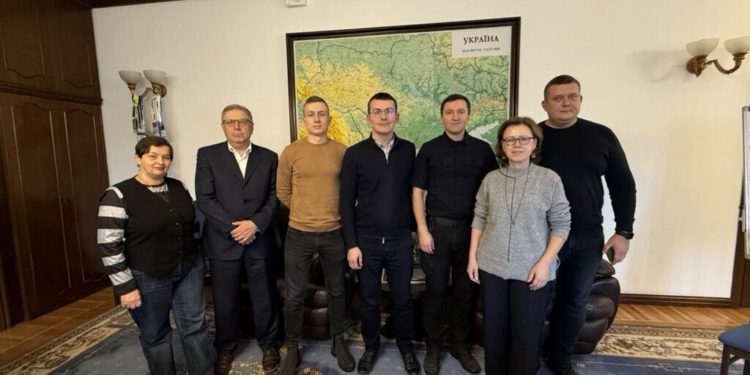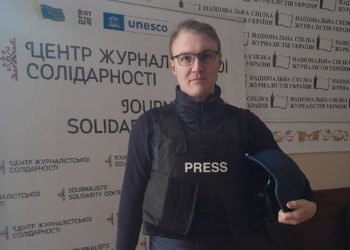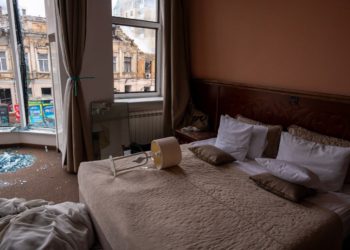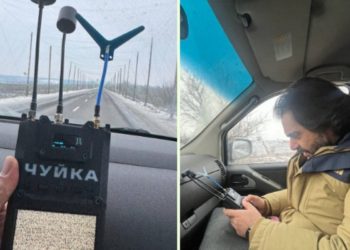Communication is one of the completed components of cooperation between media professionals and prosecutors in the investigation of war crimes against media professionals, proper documentation of war crimes, investigation of cases of damage to the activities of journalists, etc. This was discussed during a meeting of the leadership of the National Union of Journalists of Ukraine (NUJU) with the Head of the Department of Criminal and Legal Policy and Investment Protection of the Prosecutor General’s Office, Oleksii Boniuk. The main topic of the meeting was the renewal of cooperation between the NUJU and the Prosecutor General’s Office in the field of protecting the rights of media professionals. The parties emphasized that they are ready for effective interaction.
The President of the NUJU, Sergiy Tomilenko, recalled that cooperation between the Prosecutor General’s Office and the NUJU, as the largest professional journalistic organization in Ukraine, was involved in the full-scale invasion of the russian federation into Ukraine, but with the beginning of the Great War, the principles of cooperation should be adjusted in view of the standstill that has developed today.
“We are implementing systematic approaches to the interaction of media professionals with representatives of various spheres, and this gives positive results,” said the President of the NUJU.
Oleksii Boniuk proposed to jointly develop standards for interaction between the media and prosecutor’s offices in the field of investigating crimes against media professionals as an effective tool that makes it possible to clearly focus on nuances, issues, and terminology, for more effective work.
“We have already developed a standard for interaction between prosecutor’s offices and public organizations. There are already guidelines on how to document war crimes, how to interact so that evidence is admissible and appropriate, etc. Regarding media workers, there is currently a certain vacuum that needs to be filled. Standards with references to relevant sources can be focused, for example, on whether a crime was committed against a media worker or a film crew, etc.,” Oleksii Boniuk noted and suggested monitoring high-profile cases.
He suggested three initial tracks for cooperation between the NUJU and the Prosecutor General’s Office:
- Track 1 – systemic, developing standards for prosecutors in cases of investigating crimes against media workers.
- Track 2 – work on specific proceedings
- Track 3 – in the field of external and internal communications.
Sergiy Tomilenko emphasized that the NUJU has already documented a number of cases of violations of the rights of media workers, which are ready to be transferred to the prosecutor’s office, which can be analyzed to determine what methodological problems there are in this regard and what can be worked on.
“We also conducted 20 in-depth interviews regarding the violated rights of media workers and war criminals of the russian federation; we can pass this on to you so that you pay attention to whether the appropriate proceedings have been opened. Because there are cases when injured journalists do not turn to law enforcement agencies to protect their rights, mainly foreign media workers do this. For example, one German journalist was injured, but he left Ukraine because his business trip ended there, and obviously, his case does not appear in the open proceedings. Meanwhile, we cooperate with low-level international organizations, such as the European Federation of Journalists and the International Federation of Journalists, and could strengthen cooperation precisely on issues of protecting the rights of foreign colleagues.”
The First Secretary of the NUJU, Lina Kushch, drew attention to the fact that foreign journalists talk about injured colleagues at international forums, but while they are in Ukraine and may have law enforcement officers – do not do this. Therefore, cooperation between NUJU and the Prosecutor General’s Office could destroy this wall of silence.
Regarding public formats of cooperation between NUJU and prosecutors’ offices, the parties agreed to hold joint events aimed at both supporting media professionals and helping the population, in particular, frontline territories, with the help of media.
“One of our initiatives is the revival of frontline media as practically the only channel of verified information in territories where people are under constant shelling, without electricity and the Internet, and receive up-to-date information only on the basis of local printed newspapers. Therefore, prosecutors’ offices could provide these local media as a separate segment of information with the information that their readers need – in particular, where it can be found and in which ones, etc.”
One of the important topics is the cases of Ukrainian journalists who are in russian captivity.
The working meeting at the Prosecutor General’s Office of Ukraine was also attended by the Head of the Department for Investment Protection and Implementation of Prosecutors’ Specialization of the Department of Criminal Policy and Investment Protection of the Prosecutor General’s Office of Ukraine, Oleksandr Maksymenko, and the NUJU expert: coordinator of the NUJU legal hotline, lawyer of IBC Legal Services Danil Serbin, President of the Academy of the Ukrainian Press Valerii Ivanov, executive director of the AUP Andrii Kovalenko, and communications expert of the network of Journalists’ Solidarity Centers Inna Kosianchuk.

 THE NATIONAL UNION OF
JOURNALISTS OF UKRAINE
THE NATIONAL UNION OF
JOURNALISTS OF UKRAINE
















Discussion about this post